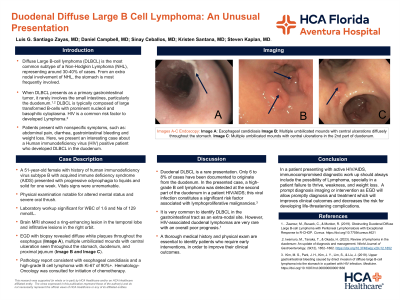Sunday Poster Session
Category: Small Intestine
P1284 - Duodenal Diffuse Large B Cell Lymphoma: An Unusual Presentation
Sunday, October 22, 2023
3:30 PM - 7:00 PM PT
Location: Exhibit Hall

Has Audio
- LS
Luis G. Santiago Zayas, MD
HCA Florida Aventura Hospital
Aventura, Florida
Presenting Author(s)
Luis G.. Santiago Zayas, MD1, Daniel Campbell, DO1, Sinay Ceballos, MD2, Kristen Santana, MD1, Steven Kaplan, MD1
1HCA Florida Aventura Hospital, Aventura, FL; 2HCA Aventura Hospital & Medical Center, Miami, FL
Introduction: Diffuse Large B-cell lymphoma (DLBCL) is the most common subtype of a Non-Hodgkin Lymphoma (NHL), representing around 30-40% of them. From an extra nodal involvement of NHL, the stomach is most frequently involved. When DLBCL presents as a primary gastrointestinal tumor, it rarely involves the small intestines, particularly the duodenum. DLBCL is typically composed of large transformed B-cells with prominent nucleoli and basophilic cytoplasma. Patients present with nonspecific symptoms, such as: abdominal pain, diarrhea, gastrointestinal bleeding and weight loss. Here, we present an interesting case about a Human immunodeficiency virus (HIV) positive patient who developed DLBCL in the duodenum.
Case Description/Methods: A 51-year-old female with history of HIV subtype B with acquired immune deficiency syndrome (AIDS) diagnosed on 6/2022, who presented to our institution due to failure to thrive and generalized weakness. Patient was diagnosed with HIV in 2021 and had a CD4 count of 44 on admission. The Gastroenterology Service was consulted due to patient reporting a 1-week history of progressive dysphagia to liquids and solids. Patient was afebrile and hemodynamically stable. On physical exam patient was alert, but easily confused. Severe oral thrush was noted, concerning for candida esophagitis or other opportunistic infection. Her labs showed pancytopenia and hyponatremia. An upper endoscopy (EGD) was completed to rule out other infections like CMV or HSV and malignancy. EGD showed diffuse esophageal candidiasis, multiple umbilicated mounds with central ulceration seen throughout the stomach, duodenum and proximal jejunum. Biopsy specimens were collected and pathology reported: esophageal candidiasis and a high-grade B cell lymphoma, with confirmatory immunohistochemical stains. Hematology/Oncology Service was consulted and recommended chemotherapy.
Discussion: Duodenal DLBCL is a rare presentation. Only 6 to 8% of cases have been documented to originate from the duodenum. In the presented case, a high-grade B cell lymphoma was detected at the second part of the duodenum in a patient HIV/AIDS; this constitutes a significant risk factor associated with lymphoproliferative malignancies. However, HIV-associated duodenal lymphomas are very rare with an overall poor prognosis. A thorough medical history and physical exam are essential to identify patients who require early interventions, in order to improve their clinical outcomes.
Disclosures:
Luis G.. Santiago Zayas, MD1, Daniel Campbell, DO1, Sinay Ceballos, MD2, Kristen Santana, MD1, Steven Kaplan, MD1. P1284 - Duodenal Diffuse Large B Cell Lymphoma: An Unusual Presentation, ACG 2023 Annual Scientific Meeting Abstracts. Vancouver, BC, Canada: American College of Gastroenterology.
1HCA Florida Aventura Hospital, Aventura, FL; 2HCA Aventura Hospital & Medical Center, Miami, FL
Introduction: Diffuse Large B-cell lymphoma (DLBCL) is the most common subtype of a Non-Hodgkin Lymphoma (NHL), representing around 30-40% of them. From an extra nodal involvement of NHL, the stomach is most frequently involved. When DLBCL presents as a primary gastrointestinal tumor, it rarely involves the small intestines, particularly the duodenum. DLBCL is typically composed of large transformed B-cells with prominent nucleoli and basophilic cytoplasma. Patients present with nonspecific symptoms, such as: abdominal pain, diarrhea, gastrointestinal bleeding and weight loss. Here, we present an interesting case about a Human immunodeficiency virus (HIV) positive patient who developed DLBCL in the duodenum.
Case Description/Methods: A 51-year-old female with history of HIV subtype B with acquired immune deficiency syndrome (AIDS) diagnosed on 6/2022, who presented to our institution due to failure to thrive and generalized weakness. Patient was diagnosed with HIV in 2021 and had a CD4 count of 44 on admission. The Gastroenterology Service was consulted due to patient reporting a 1-week history of progressive dysphagia to liquids and solids. Patient was afebrile and hemodynamically stable. On physical exam patient was alert, but easily confused. Severe oral thrush was noted, concerning for candida esophagitis or other opportunistic infection. Her labs showed pancytopenia and hyponatremia. An upper endoscopy (EGD) was completed to rule out other infections like CMV or HSV and malignancy. EGD showed diffuse esophageal candidiasis, multiple umbilicated mounds with central ulceration seen throughout the stomach, duodenum and proximal jejunum. Biopsy specimens were collected and pathology reported: esophageal candidiasis and a high-grade B cell lymphoma, with confirmatory immunohistochemical stains. Hematology/Oncology Service was consulted and recommended chemotherapy.
Discussion: Duodenal DLBCL is a rare presentation. Only 6 to 8% of cases have been documented to originate from the duodenum. In the presented case, a high-grade B cell lymphoma was detected at the second part of the duodenum in a patient HIV/AIDS; this constitutes a significant risk factor associated with lymphoproliferative malignancies. However, HIV-associated duodenal lymphomas are very rare with an overall poor prognosis. A thorough medical history and physical exam are essential to identify patients who require early interventions, in order to improve their clinical outcomes.
Disclosures:
Luis Santiago Zayas indicated no relevant financial relationships.
Daniel Campbell indicated no relevant financial relationships.
Sinay Ceballos indicated no relevant financial relationships.
Kristen Santana indicated no relevant financial relationships.
Steven Kaplan indicated no relevant financial relationships.
Luis G.. Santiago Zayas, MD1, Daniel Campbell, DO1, Sinay Ceballos, MD2, Kristen Santana, MD1, Steven Kaplan, MD1. P1284 - Duodenal Diffuse Large B Cell Lymphoma: An Unusual Presentation, ACG 2023 Annual Scientific Meeting Abstracts. Vancouver, BC, Canada: American College of Gastroenterology.
